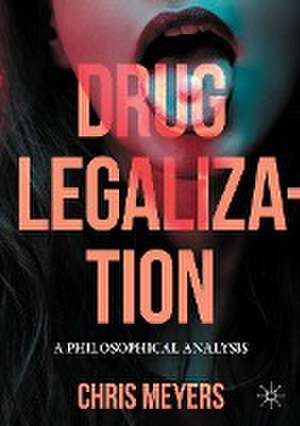Drug Legalization: A Philosophical Analysis
Autor Chris Meyersen Limba Engleză Paperback – 13 dec 2022
The presentation invites readers to think clearly about the reasons and principles that should determine public policy and law, while also delving into the deeper philosophical questions underlying the drug prohibition debate. Is it morally wrong to use drugs? If so, would that be reason enough to make it illegal? Are there good reasons in favor of using illicit drugs? Do addicts lack free will, and if so, would it be unjust to punish them? What is (or ought to be) the purpose of punishment? Is the state justified in limiting the freedom of competent adults for their own good? What should be the goal of drug policy, reduced use or reduced harm?
The purpose of the book is twofold. First, it is a review of the arguments for and against drug prohibition, a useful tool for policy makers, activists, and concerned citizens with an understanding of the relevant considerations for determining how we should reform our failing drug policy. Second, the book serves as a case study in the deeper issues of justice, the nature of law, rights and liberties, and the public good. Students studying applied ethics, political science, or public policy will benefit greatly from Meyers' approach.
Preț: 453.21 lei
Nou
Puncte Express: 680
Preț estimativ în valută:
86.72€ • 90.73$ • 72.04£
86.72€ • 90.73$ • 72.04£
Carte tipărită la comandă
Livrare economică 03-17 aprilie
Preluare comenzi: 021 569.72.76
Specificații
ISBN-13: 9783031170041
ISBN-10: 3031170040
Pagini: 315
Ilustrații: VIII, 315 p.
Dimensiuni: 148 x 210 mm
Greutate: 0.39 kg
Ediția:1st ed. 2023
Editura: Springer International Publishing
Colecția Palgrave Macmillan
Locul publicării:Cham, Switzerland
ISBN-10: 3031170040
Pagini: 315
Ilustrații: VIII, 315 p.
Dimensiuni: 148 x 210 mm
Greutate: 0.39 kg
Ediția:1st ed. 2023
Editura: Springer International Publishing
Colecția Palgrave Macmillan
Locul publicării:Cham, Switzerland
Cuprins
Part I: Background.- Chapter 1: The Question—Should Drugs be Prohibited?- Chapter 2: Just the Facts.- Part II: Morality.- Chapter 3: Religion and Drug Use.- Chapter 4: Is it Morally Wrong to Use Drugs?- Chapter 5: Morality and the Law.- Part III: Liberty.- Chapter 6: Liberty and the Right to Get High.- Chapter 7: Libertarianism and Laissez Faire Legalization.- Chapter 8: Paternalism—Prohibiting Users from Harming Themselves.- Part IV: The Criminal Justice System.- Chapter 9: Crime and Punishment.- Chapter 10: The Drug War and Civil Rights.- Part V: The Public Good.- Chapter 11: Social Consequences of Drug Prohibition.- Chapter 12: Social Consequences of Drug Legalization.- Chapter 13: Alternatives to Prohibition & Legalization
Part VI: Conclusion.- Chapter 14: Belling the Cat.
Notă biografică
Chris Meyers teaches philosophy at George Washington University. He previously taught at the University of Southern Mississippi.
Textul de pe ultima copertă
This textbook introduces students to the various arguments for and against the prohibition of recreational drugs. The arguments are carefully presented and analyzed, inviting students to consider the competing principles of liberty rights, paternalism, theories of punishment, legal moralism, and the social consequences of drug use and drug laws. Meyers extends this examination by presenting alternatives to the prohibition/legalization dichotomy, including harm reduction, decriminalization, and user licensing or on-premise use.
The presentation invites readers to think clearly about the reasons and principles that should determine public policy and law, while also delving into the deeper philosophical questions underlying the drug prohibition debate. Is it morally wrong to use drugs? If so, would that be reason enough to make it illegal? Are there good reasons in favor of using illicit drugs? Do addicts lack free will, and if so, would it be unjust to punish them? What is (or ought to be) the purpose of punishment? Is the state justified in limiting the freedom of competent adults for their own good? What should be the goal of drug policy, reduced use or reduced harm?
The purpose of the book is twofold. First, it is a review of the arguments for and against drug prohibition, a useful tool for policy makers, activists, and concerned citizens with an understanding of the relevant considerations for determining how we should reform our failing drug policy. Second, the book serves as a case study in the deeper issues of justice, the nature of law, rights and liberties, and the public good. Students studying applied ethics, political science, or public policy will benefit greatly from Meyers' approach.
Caracteristici
This textbook introduces students to the various arguments for and against the prohibition of recreational drugs Are there good reasons in favor of using illicit drugs? Students studying applied ethics, political science, or public policy will benefit greatly from Meyers' approach
